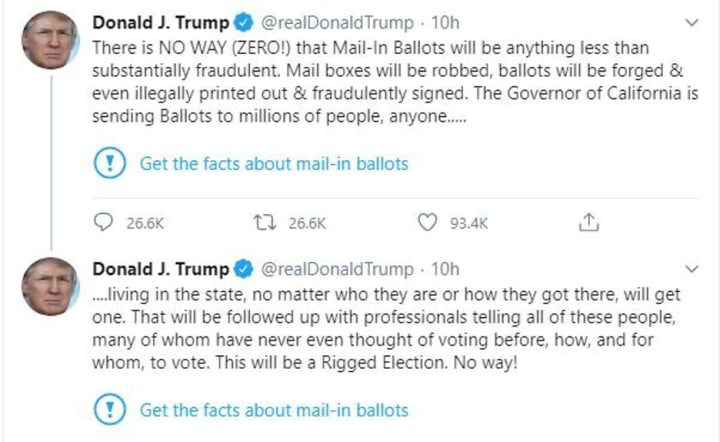
This week Twitter made the move to start labelling misleading or “fake news” tweets with a disclaimer. And their first citation went to a tweet by non other than President Trump which read “There is NO WAY (ZERO!) that Mail-In Ballots will be anything less than substantially fraudulent. Mail boxes will be robbed, ballots will be forged & even illegally printed out & fraudulently signed. The Governor of California is sending Ballots to millions of people…. And that “this will be a rigged election”

Believe it or not, this was not the most shocking part of the tweet.
Just underneath it, there appeared a disclaimer button that said “Get the facts about mail-in ballots” which led to another page with a collection of verifiable facts and articles in relation to mail in voting. The fact alone that Twitter did this is a really big deal.
Then yesterday, President Trump hit back by signing an executive order that aims to limit the broad legal protections that social media platforms currently have. So, lets dig into that a little bit:
Section 230 is the law that enabled the internet as we know it today. Traditional news publishing companies are responsible for the content they publish. If a newspaper published an ad telling people to “come join the Nazi party, we hate everyone!”, they could be sued for that. But imagine if the same rules applied to websites? If Facebook, Yelp, Reddit, with millions of contributors, were held responsible for every single post, they would have never become, well, Facebook, Yelp and Reddit. Lawmakers recognized this challenge early on and wrote Section 230 to prevent stifling the revolutionary potential of the internet by labeling them as platforms not publishers. Their special status as platforms protects them from liability, so a business can sue a Yelp reviewer for posting lies about their business, but they can’t sue Yelp. With me so far?
Good, because this part is important too. The law also gives the platform themselves the right to set their own rules of service, moderate the content as they choose, and they can decide who is in and who gets kicked out. There is a lot of confusion around this. Many critics, the President included, say that censorship on social media is a violation of our first amendment rights to freedom of speech. But that’s not how the First Amendment works. The first Amendment says that the government cannot restrict freedom of speech, not private companies. The government can’t restrict you, me or Twitters rights to free speech, but Twitter has the right to control the content on their platform.
So to bring it back to today, Trump’s executive order aims to remove the internets special status, by recategorizing them as publishers and holding them liable for everything that is posted on their site. This would completely change the internet as we know it as most website just don't have the capacity to do that and would inevitably have to shut down. It’s also really unlikely that this order would make it through the courts, and from what I’ve been reading most lawyers say that this probably a symbolic act, or a move to get back at or challenge Twitter for censoring his tweet. Trump and Attorney General Barr made the case that Twitters “editorial decisions” make them publishers, not platforms. And that Section 230 enables these massive internet companies to censor and control public access to information.
Now Twitters response? Historically, twitter and other social media giants have taken a neutral, hands off approach - they just provide the platform and they leave the curation up to the users. But the 2016 election changed all that. The exploitation of the platforms by bad actors intentionally spreading false information, manipulating voters and creating deep divisions in our society led to massive pressure for reform and tech companies have been grappling with how.
The answers might seem obvious to you - if it’s a lie, just take it down. But, if you think deeper you begin to understand how complicated this mess we are in is. Haven’t you ever tried to have a conversation with a family member and feel like you are both living in two alternate realities? Now imagine opening your living room to the entire world and you begin to see the kind of problems that big social media platforms are facing. Technology has democratized access to information, and that’s a good thing, but it also means that your truth and facts often depend on where you are getting your information from. And that’s a lot of responsibility for whoever is the ultimate “editor” of the content.
So, do social media platforms have a responsibility to moderate the content on their platform?
Should public officials be held at a higher standard?
Who gets to be the judge of what is acceptable and what’s not?
How do you distinguish between opinions and lies? ‘
These are hard questions. I don't have the answers, so I'm turning it to you as I expect this debate isn't going to go away soon. What do you think?
Sources:
https://www.theverge.com/interface/2020/5/27/21270556/trump-twitter-label-misleading-tweets
https://www.nytimes.com/2020/05/26/technology/twitter-trump-mail-in-ballots.html
https://www.wsj.com/articles/twitter-plays-into-trumps-hands-11590621733
https://www.vox.com/recode/2020/5/28/21273241/section-230-explained-trump-social-media-twitter-facebook
About the Creator
Nathalia Ramos
Spanish/Australian living in LA.
Actor. Writer. Political Scientist.
IG: @NathaliaRamos Twit: @nathalia73






Comments
There are no comments for this story
Be the first to respond and start the conversation.